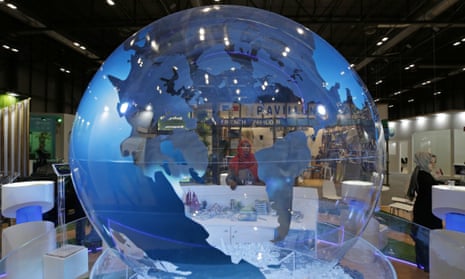Boris Johnson’s first steps on the international stage after Brexit will be to hail Britain’s role in forging a new global consensus on the climate crisis – although he has not yet said who will lead that charge.
The UK will host the crunch UN climate talks, COP 26, this November in Glasgow, in what experts say is the last chance for international cooperation on the crisis. The prime minister, in launching the UK’s strategy for the talks on Tuesday, stops short of promising to “get climate done”, but in making his own involvement clear he will at least reassure climate activists and governments concerned at a hitherto confused and chaotic start to the UK’s presidency.
Late on Friday, the Downing Street adviser Dominic Cummings intervened to sack the former minister who had been slated to lead the talks, Claire O’Neill. She was accused of numerous failures in her dealings with officials, her own and those from other countries, and deemed not to have enough clout or persuasion to bring reluctant countries into the fold.
No replacement has yet been announced, with rumours swirling of a Whitehall power struggle. The COP 26 unit is within the Cabinet Office, but needs strong relationships with the Foreign and Commonwealth Office, and with the Department for Business, Energy & Industrial Strategy. But the confusion over how the talks will be led and managed has left bystanders, including the UN, the EU and other major countries, bemused.
Johnson’s re-assumption of control was essential, according to Saleemul Huq, director of the International Centre for Climate Change and Development in Bangladesh, and a veteran of the UN talks. “Time is running out fast, but if the prime minister takes an interest and puts his weight behind the required diplomacy, then the UK can still salvage COP 26,” he said.
The task ahead is huge. The Paris accord of 2015 marked the first time that rich and poor nations came together resolving to hold global heating to no more than 2C, and preferably 1.5C, which scientists say is the limit of safety. But the Paris pledges to curb carbon emissions are inadequate. This year, governments must scale up their ambition or face climate breakdown within the decade.
That effort will reach its climax in Glasgow, but the real work needs to be done now. “It really is a grind,” said Mary Robinson, former president of Ireland and ex-UN commissioner for human rights, who has served twice as a UN climate envoy. “I’ve been at those ministerial meetings. You could not believe how boring some of them were. But you need to squeeze the governments, between the bottom-up – pressure from civil society – and the top-down [pressure from businesses and political leaders].”
According to Tom Burke, founder of the environmental group E3G, who attended the first ever UN climate COP, the next few months are crucial. “It’s not what you’re going to do in September, October; that’s too late. It’s what you’re doing in March and April that will make the difference.”
The government’s strategy encompasses all the diplomatic and economic expertise the UK can bring to bear, from ambassadorial schmoozing in capitals from Dhaka to DC, to boardroom influence in major banks. The Prince of Wales and Prince William will also weigh in, with Charles gathering business leaders almost monthly to press them to make changes.
While the UK has an enviable global network of diplomats and “soft power”, it also faces a unique difficulty. Brexit means that even while British representatives are pushing the climate agenda, separate trade negotiators are talking to the same foreign governments – in some cases even the same people in those governments – about trade deals. Several experts said they feared it would be difficult to combine the two.
“Call me sceptical that Boris Johnson’s government will confront Trump’s climate nihilism ahead of Glasgow while simultaneously having to beg him for a post-Brexit trade deal,” said Paul Bledsoe, a climate adviser in Bill Clinton’s White House and close observer of COPs. “Boris’s Brexit will have international climate costs, starting with lack of pressure on the US, whose lack of leadership under Trump has allowed an ultra-dangerous global climate backslide.”
The US will be tied up with its presidential election this year, and it may yet be possible to forge a deal that the US at least does not object to, even if active participation is unlikely.
With regard to the other key country, China, Britain may have to rely on the negotiating might of the EU, which is arranging two major EU-China summits, in March and September, where the climate crisis will have top billing.
As the last two decades of UN climate talks have shown, progress can sometimes be made even when big countries are reluctant to play ball. One of the greatest strengths of the UN process is that every country, from poorest to richest, has an equal say, and even the mightiest, from the US and China to the EU and India, have on occasion had to bow to the massed ranks of the poor and vulnerable.
Building the broadest possible coalition is key, according to Fatih Birol, executive director of the International Energy Agency, the leading global adviser on energy. “What the world needs is a grand coalition. That means governments from around the world, but also industry and civil society. In the absence of that, it is too difficult to change direction and avoid [disaster],” he said. “COP 26 should be the focus of getting that coalition.”
He believes the UK conference will be vital if the pledges made at Paris are to be fulfilled and the world is to avoid climate breakdown. “I live in Paris, I love Paris,” Birol said. “But I’m hoping to love Glasgow even more.”
